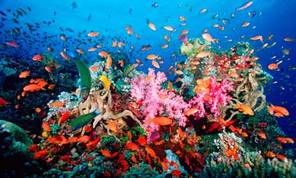 By Bridget Hennessy A study from the Universities of Essex and Exeter has found that the sound of coral reefs dying can be heard, or really, harder to hear. These reefs are being impacted from overfishing and other human activity, causing them to actually be much quieter than the protected and healthy coral reefs in the same area. The study was performed by taking acoustic recordings of the coral reefs around the islands in the Philippines, and it revealed that the noise produced by the fish and crustaceans around unprotected, damaged reefs was only one third of the sound produced at protected coral reefs. There were significantly fewer remaining marine animals at the unprotected, damaged reefs than at the healthy ones. Though the human activity causing this is obviously dangerous to the coral reefs that supply nutrients to the marine life, it is especially harmful because the reef fish and invertebrates in the larval stages use the noise from coral reefs to orient themselves back to the reefs. When less sound is produced, the larvae are more unlikely to make it back to the reefs. This affects later generations and the population levels in the ocean and also pushes fish farther away from damaged coral reefs, as the fish dislike the smell of the unprotected reefs, which further decreases the likelihood of the reefs surviving. Article link: http://www.sciencedaily.com/releases/2014/12/141203083706.htm
0 Comments
Leave a Reply. |
WELCOME, UMICH SCIENTISTAS!
CAMPUS PICS
WHAT'S NEWUPCOMING EVENTSPAST POSTS
October 2022
SORT BY TAG |
The Scientista Foundation, Inc. All Rights Reserved © 2011-2021 | Based in NY | [email protected]
The Network for Pre-Professional Women in Science and Engineering
The Scientista Foundation is a registered 501(c)(3) -- Donate!
The Network for Pre-Professional Women in Science and Engineering
The Scientista Foundation is a registered 501(c)(3) -- Donate!


 RSS Feed
RSS Feed